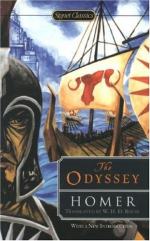This was the song that the famous minstrel sang. But the heart of Odysseus melted, and the tear wet his cheeks beneath the eyelids. And as a woman throws herself wailing about her dear lord, who hath fallen before his city and the host, warding from his town and his children the pitiless day; and she beholds him dying and drawing difficult breath, and embracing his body wails aloud, while the foemen behind smite her with spears on back and shoulders and lead her up into bondage, to bear labour and trouble, and with the most pitiful grief her cheeks are wasted; even so pitifully fell the tears beneath the brows of Odysseus. Now none of all the company marked him weeping; but Alcinous alone noted it, and was ware thereof, as he sat nigh him and heard him groaning heavily. And presently he spake among the Phaeacians, masters of the oar:
’Hearken, ye captains and counsellors of the Phaeacians, and now let Demodocus hold his hand from the loud lyre, for this song of his is nowise pleasing alike to all. From the time that we began to sup, and that the divine minstrel was moved to sing, ever since hath yonder stranger never ceased from woeful lamentation: sore grief, methinks, hath encompassed his heart. Nay, but let the minstrel cease, that we may all alike make merry, hosts and guest, since it is far meeter so. For all these things are ready for the sake of the honourable stranger, even the convoy and the loving gifts which we give him out of our love. In a brother’s place stand the stranger and the suppliant, to him whose wits have even a little range, wherefore do thou too hide not now with crafty purpose aught whereof I ask thee; it were more meet for thee to tell it out. Say, what is the name whereby they called thee at home, even thy father and thy mother, and others thy townsmen and the dwellers round about? For there is none of all mankind nameless, neither the mean man nor yet the noble, from the first hour of his birth, but parents bestow a name on every man so soon as he is born. Tell me too of thy land, thy township, and thy city, that our ships may conceive of their course to bring thee thither. For the Phaeacians have no pilots nor any rudders after the manner of other ships, but their barques themselves understand the thoughts and intents of men; they know the cities and fat fields of every people, and most swiftly they traverse the gulf of the salt sea, shrouded in mist and cloud, and never do they go in fear of wreck or ruin. Howbeit I heard upon a time this word thus spoken by my father Nausithous, who was wont to say that Poseidon was jealous of us for that we give safe escort to all men. He said that the god would some day smite a well-wrought ship of the Phaeacians as she came home from a convoy over the misty deep, and would overshadow our city with a great mountain. Thus that ancient one would speak, and thus the god may bring it about, or leave it undone, according to the good pleasure of his will. But come now,




